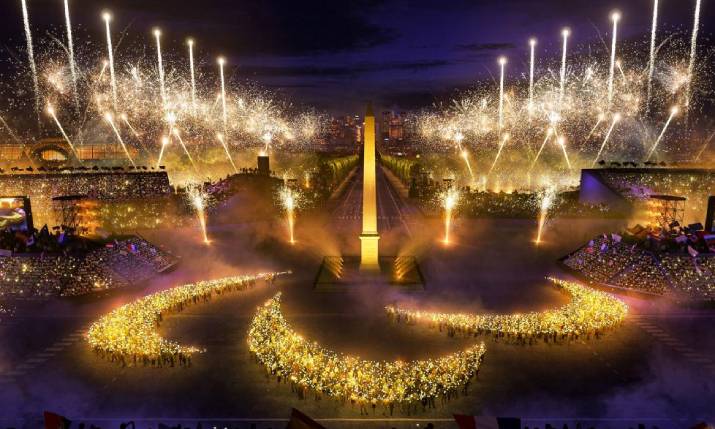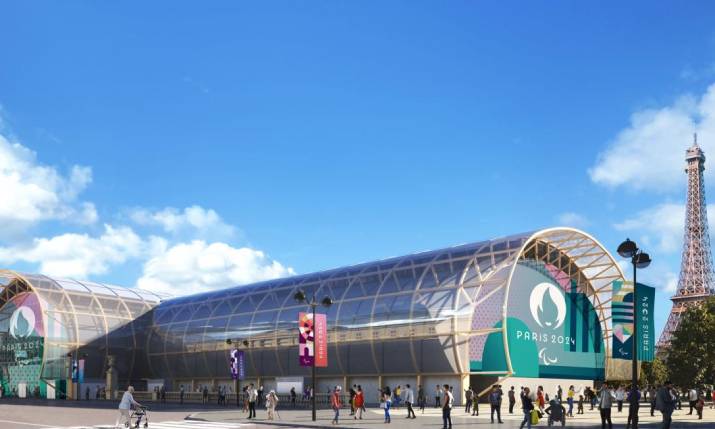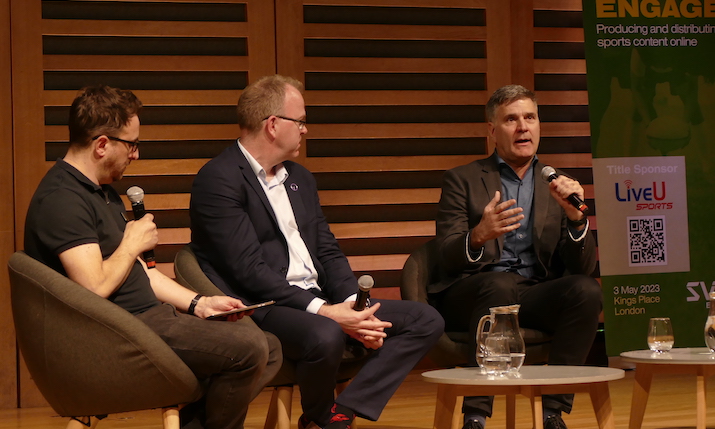Paris 2024: The IPC on making the Paralympic Games the best ever while changing culture and attitudes towards disability

One of the Paralympic Games’ Organising Committee’s key commitments is organising a top level sporting event that captures the audience’s imagination, such as through the first Opening Ceremony to be held outside a stadium ⒸParis 2024
Paris 2024 is just over one year away and hot on its heels will be the Paralympic Games, which this year is going to be the biggest and best ever with more live sports being broadcast, a record breaking number of rights deals, and an increased focus on digital media.
Yet it is not only about increasing viewing figures and broadcasting hours for Craig Spence, the International Paralympic Committee’s (IPC) chief brand and communications officer, and John Lisko, the IPC’s managing director of global media rights. For them, it is crucial that the Paralympics is a flagship for using sport as a tool to change culture and attitudes towards disability around the world.
Most successful Games to date
On the overall vision for the 2024 Paralympics, Spence says: “I think in terms of broadcasting, Paris 2024 has the potential to be our most successful Games to date. There are several reasons for that. We’re working hard to really broaden the coverage in terms of the products, so for Paris 2024, we will have all 22 sports live for the first time. In Tokyo, we had 19 sports, with ENG coverage of the remaining three, but for Paris – for the first time ever – [we will have] 22 sports live.”
He adds that in Rio there were 16 live sports, “so it’s real rapid progress in terms of the product,” Spence adds. “That’s a credit to the organising committee as well, who we’re really keen to step up the level of coverage and work with OBS on that; it’s amazing.”
Lisko comments on the great progress already made by the Paralympic Committee on rights: “We looked at it from an approach to coverage, and working with our rights centres around the world, we’ve changed the way that we’re working. We’ve moved from just getting coverage to really maximising and broadening the viewership as much as possible.
“Right now, 14 months out before the Games, we already can secure coverage for 75% of the planet’s population,” Lisko continues. “We can ensure six billion people will see the Games, and we still have 14 months to go, and we’re not done yet. So we’re making terrific progress with the number of deals that we have in place.”
However Spence adds that even at this point in rights sales, Paris has already exceeded the total revenues for the Tokyo Games: “What we’re trying to do is really maximise revenue as well. So the Paralympics, previously with some broadcasters, they’ve treated the event as a charity event, “oh yeah, we need to tick the box and do the Paralympics”. But now with the products that we’ve got, the sport is sensational. We’ve got athletes who are delivering performances that would win that Olympic gold. Marcus Rehm, the German long jumper, was an example of that; his world record would’ve won every Olympics since 1992. So the product is great. With months still to go, we’ve already generated more revenue than we had for Tokyo, which is pretty phenomenal and puts us in a really strong position.
“The broadcasters are now realising that this is actually a great sporting event and they’re willing to pay more for it,” continues Spence. “And we’re being a bit more aggressive this time, not just in terms of if you buy the rights, use them; we’re also saying, you may have paid [X amount for the rights] previously, but that’s not getting you anywhere close to the rights this time round. If you don’t pay, you’re not going to get them. So that direct, more aggressive strategy is paying dividends, and that’s why we’ve already exceeded the Tokyo revenues with only three quarters of the market secured.”
For the Tokyo Games there were 150 TV, radio, and online outlets showing the Games in 107 territories. Notes Spence: “Now we’ve not exceeded that yet, but many of our deals for Tokyo were done very last minute. With 14 months to go, we are in the strongest position we’ve ever been in for Paralympics, which is supremely exciting for us. And to have 75% of the globe covered already is really good. So we’ve got 14 months to really pinpoint how we turn on that remaining 25%.”
Spence goes on: “In terms of ticket sales, we’re the third biggest sporting event on earth. There’s only the Olympics and the FIFA World Cup that sell more than us. For Paris we’re aiming to sell three million tickets, which would surpass the 2.8 million we sold for London 2012. That’s the joy of the Games; you’ve got a whole city organising the first and the third biggest sporting events in the period of six weeks, in this fantastic festival of sport.”

The visual identity of the Paris 2024 Games was created around four main themes: celebration, transfer, rationalisation and personalisation ⒸParis 2024
All about relationships
Lisko says this rights coverage success is all about working on the Paralympic Committee’s relationships with broadcasters. “We’re working with the broadcasters to maximise the use of the rights,” he explains. “So we want to make sure that they’re maximising all the airtime across all their traditional and their digital platforms.”
He comments that they are also working with streaming platforms and with broadcasters that intend to use digital media to ensure that the content will suit the channel it is pushed over. “With all the streaming platforms that come onboard, we’re working with them to make sure that they’re using all of those platforms to their best potential; it’s not just taking content and running it on a different platform, but adjusting the content to make sure that it’s relevant and interesting, so we’re bringing in a variety of different audiences.”
Lisko adds: “TV’s an important component, but how we can use the streaming platforms, social platforms, everything that’s available to us? So that’s contributing to why we expect a tremendous games.”
Spence says digital media is increasing in importance for the Paralympic Games coverage. He comments: “I think digital is really fundamental for us, for engaging in new audiences. When you look at our demographics they are very different to other sports events; we’re very much a family audience.
“One thing that’s different for us compared to the Olympics is we retain the digital rights in many territories. What does that mean? That enables us to live stream the Games on our own platforms, and then produce highlights, clips, and memorable moments almost in real time on our social media channels, which sets us aside from the Olympics. That’s really helping us to engage viewers,” says Spence.
“We’re seeing the success of digital, not just during Games time, but outside of the Games too,” Spence continues. “Last year we had over a billion views of video content across our live platforms, and that was a Winter Games year, which was a much smaller sports event for us than we had for Tokyo in 2020 into ’21. That’s been driven very much by our approach on TikTok, where our content is unique and very different to every other international federation. I’m seeing other international federations almost copying now what we’re doing. On TikTok I think we’ve probably got the highest engagement rates in terms of followers of any sport or federation in the world, and that’s because the content is unique, engaging, and it’s showing top class spot. So digital is fundamental to what we’re doing.”
There are three goals to the Paralympic Committee’s digital plan, which begins with a content strategy one year out from each Games. Spence says the first is to educate people about the leading athletes in the sports, then to learn about the sports themselves which differ to the mainstream, and finally, he says: “The third thing that is absolutely critical for us is we want people to understand the impact that our sports event has on changing the world for the better. So that’s not just a case of you changing our attitude towards disability as a result of the Paralympics; that’s understanding that President Macron announced a Euro 1.5 billion investment in improving accessibility in France as a result of the Paralympics being in his country. That’s the impact that we have, and we want to really trigger that change.
“We’ll be creating various content around that, and we’re working with our broadcasters also to give them some ready-made content, such as what we’re doing with HBS [which is working with European rights holder InFront], so that our broadcasters have some ready-made content that they can use across their digital channels to drive viewership ahead of the Games.”
Going forwards the Paralympic Committee aims to do even more with digital content, says Lisko. “This is something that we’re pushing the rights holders on, to make sure that they’re fully exploiting their rights to the best potential. We want them to use all of the digital platforms and streaming platforms; everything that’s available to them. This is a way that we’re thinking about Paris for now, and even beyond, to Milano, to LA ’28, into the future.”
Lisko adds: “We’ve got unbelievable content that’s truly unique and different. When people see it, they engage with it. We’re building content, we’re cutting content, we’re editing content in a way that understands who the audience is so it’s content they want to engage with. We’re not just repurposing a highlight video and dropping it in, but we’re making it unique and relevant.”

Venues for the Paralympic Games 2024 will be decorated in bright colours to represent the celebration of sport ⒸParis 2024
Flagship broadcaster
Channel 4 is the leading broadcaster globally in terms of bringing Paralympic Games coverage up to the same standard as the Olympics, and to a far more vast audience than any other broadcaster has achieved before. Since London 2012 the UK-based broadcaster has pushed boundaries on its Paralympic coverage, and the Committee for the Games holds Channel 4 up as the flagship example that others should be taking note of.
Lisko comments: “I think we’ve done a really good job of holding Channel 4 up as a true gold standard of how broadcasters should think about the Games, and embrace the Games as part of their organisation. What we’re hearing from other rights holders is they want to be like Channel 4, so Channel 4 has become a role model for the planet.”
Lisko says the Committee is focusing on using the blueprint of what Channel 4 has done, “so that it becomes bigger [for other broadcasters] than just treating this as a normal rights holder deal”.
“It’s not just about paying money for the rights, it’s about taking the rights, owning the rights, and truly exploiting what the potential can be, not just on the media platforms – which is critically important – but also the call for making sure that there’s also a world-class promotional campaign that will entice viewers to come, make them want to come, and engage them,” says Lisko.
Spence reckons the time difference for 2024 between London and Paris is enabling Channel 4 to go large once again: “I think what I love about Channel 4’s plans at the moment is, it’s almost a home Games. They’re treating this as almost a home Game for us, and a huge opportunity to really engage audiences.”
He goes on: “What’s so special about Channel 4 is they don’t just treat the Paralympics as, “we’ve got the rights”. They see this as how can they lead a social movement on driving inclusion for persons with disabilities? Their entire business operation now is based around inclusion, and that totally aligns with our vision of using para-sport to drive inclusion with persons with disabilities.
“What we’re trying to do now – and what’s joyous with Channel 4 is – they’re willing to go to other broadcasters and say, “this is how we’ve done it, this is how we’ve revolutionised our business from top to bottom and bottom to top, to ensure that everyone’s thinking about inclusion”. And in the same way that we have every broadcasters coming to us going, “what did Channel 4 do?”, Channel 4 are more than willing to go up to them and say, “this is how we did it, and this is how we can do it”.”
Spence says Channel 4 worked very closely with NHK in the build up to and through Tokyo 2020. The broadcaster has also been to visit France Television on several occasions, according to Spence, and is now initiating the conversation with all the other rights holders. He adds: “So what we’re trying to see is a shift change with our rights holders; this is not just an opportunity to show a great sporting event, this is an opportunity to really drive inclusion in your country. And that’s what makes the Paralympics the most unique sporting event on planet Earth; we are an amazing sports event with a very strong sense of purpose.”

Craig Spence, chief brand and communications officer at the International Paralympic Committee [centre] and Tim Stott, digital executive producer, HBS [right] on stage at SVG Europe’s Create, Share, Engage event in 2023
Spence says: “I think coming back to Europe, and the impact that London 2012 had on Europe last time, I think presents a great opportunity for us. What’s great about Europe is, we’re working with InFront [as the European rights holder]. So we moved away on this cycle [of the Games] from EBU, and we went to InFront. That was a big step change for us [but] the goal of the Paralympic movement is we’re not scared to take risks.
“Moving the rights away in Great Britain from the BBC to Channel 4 [in 2012] was a risk, but it worked,” continues Spence. “Here, we moved the rights away from EBU to InFront, and InFront did a stellar job in securing a record number of European broadcasters showing Beijing 2022, and already with 14 months to go they’ve pretty much secured the whole of Europe for us, turning many dark markets into light markets, for the first time in many cases.
“We’re a movement that pushes the boundaries and anyone we work with, we want to do the same,” Spence adds. “So we push, we push, we can do better. And now we think we’re seeing the fruits of our labour.”
Targeting more reach
Going forwards the US is a target market for the Paralympics, Spence explains: “The profile of Paralympics in the US is a lot lower than it is in Europe. I think most people, when they think of disability sport in the US, think of the Special Olympics, so therefore the LA ’28 Paralympics is such an opportunity for us to change that. We’re all about using sport as a tool to change culture and change attitudes towards disability around the world, so in LA, if we can get widespread coverage, then almost get Hollywood to change its approach to disability, then that cultural switch is going to happen.”
Lisko adds: “Building on what Craig said, that’s why it’s so important about the media rights holders not looking at this as just buying the right to sport, but instead look at the responsibility that we hope that they realise they have to help really influence changing the way people think about people with disability in general.”
Spence comments: “Look at Channel 4. Before 2012, you very rarely saw a person with a disability on TV. Channel 4 had 50% of their presenters with a disability for the 2012 Games, and many of those presenters have now gone on to other channels, so you’ve got like JJ Chalmers presenting the BBC Olympic coverage [and more].”
On the broadcaster viewpoint to the Paralympic Games, Lisko adds: “It’s about the whole; it’s the way that they’re thinking about it from a full company mission standpoint. It’s in front of the camera, it’s behind the camera, it’s the way the organisation works. And that’s critical. That’s what leadership is about, and we need that. So it’s less about the demography, it’s more about focusing on key markets and raising the profile across the board.”
Concludes Spence: “We are a sport event that can touch every single emotion that you can physically feel, I think. And it’s great sport. So if we attract sports fans and non-sports fans, but we trigger change, that’s the most important thing.”
France will be hosting its first-ever Summer Paralympic Games in 2024. The programme will include 22 sports and 549 events, and will take place from 28 August to 8 September 2024

